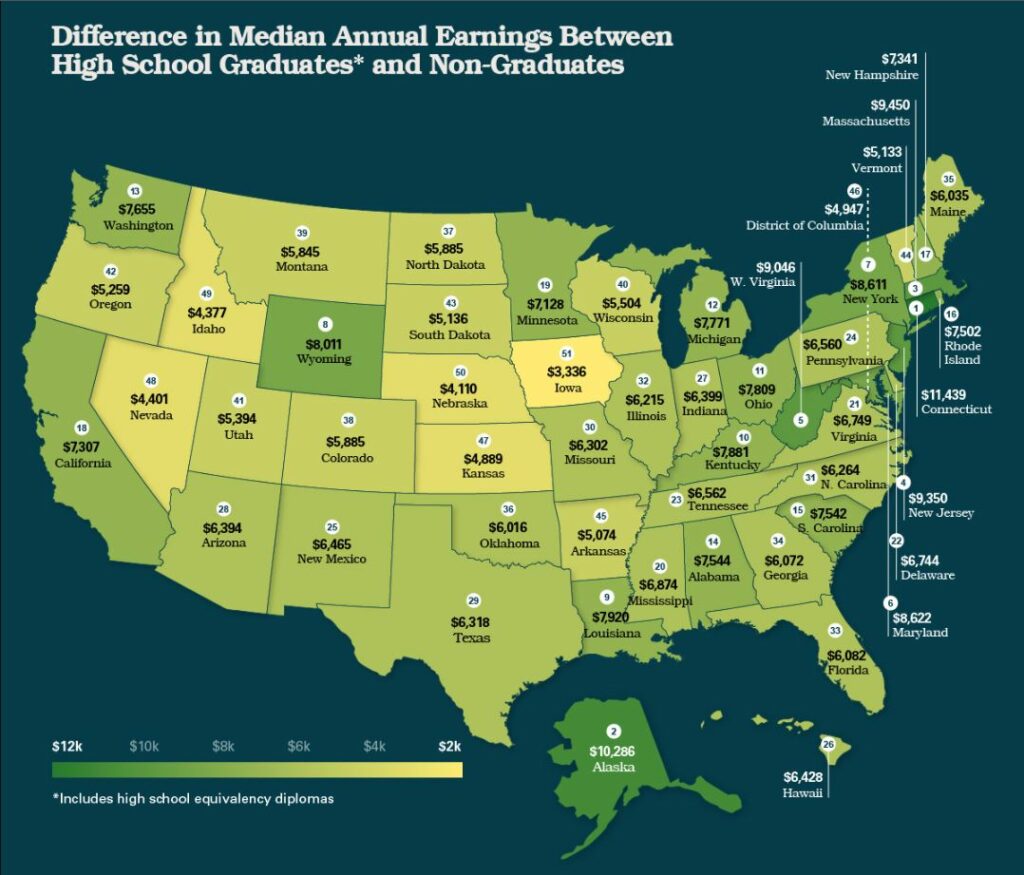In the grand scheme of our lives, the act of graduating from high school is akin to laying down the first crucial stepping stone towards a garden of opportunities. It is not merely an academic milestone but a catalyst for long-term triumphs across the various arenas of our lives. A high school diploma symbolizes a fundamental rite of passage that launches us into higher realms of education, better job prospects, and greater earning potential. It is the linchpin that holds the power to unlock doors to future successes, nurturing the seeds of potential we each carry within.
When we delve into the statistics, the narrative of a high school diploma’s importance is compellingly clear. In 2021, the U.S. saw a rise in the high school completion rate to 91.1% for those aged 25 and older—an indicator of the nation’s commitment to education. Regrettably, this statistic also indicates that nearly 9% of the American population lacks a high school diploma.
The merits of this achievement extend beyond the immediate joys of graduation. Data reveals that high school graduates are more likely to enjoy enhanced job prospects and higher earnings. Additionally, a diploma serves as a springboard for educational advancement, a critical consideration given that over a third of adults now pursue degrees beyond high school, empowering themselves with the expertise demanded by today’s competitive job market.
However, this landscape is not without its disparities. The absence of a high school diploma often correlates with significant socioeconomic challenges—restricted career opportunities, limited income potential, and heightened vulnerability during economic downturns. These hardships underscore the urgent need for educational equity and support for those who have yet to complete their high school education.
In Michigan, the tangible impact of educational attainment on income is starkly evident, presenting a compelling argument for the pursuit of a high school diploma. Statistical analyses draw a clear line connecting educational background to earnings. For instance, high school graduates typically earn significantly more than those without a diploma. This difference can translate into an estimated $300 more per bi-weekly paycheck or an extra $7,800 per year. While this figure may seem modest at a glance, it accumulates to a substantial sum over time, leading to a sizable impact on an individual’s quality of life. This additional income can be transformative, providing financial flexibility and security. It can mean the difference between just scraping by and being able to invest in a future—whether that’s through purchasing a home, saving for a child’s education, or investing in personal development and further education. The disparity in income between high school graduates and non-graduates underscores the vital importance of completing high school education—not only for personal advancement but also for ensuring economic stability.
The implications of this earning gap resonate beyond individual circumstances, affecting community prosperity and economic vitality. As individuals increase their earning power, they can contribute more to their local economies through spending and taxes, fostering a cycle of growth and improvement within their communities. For Michigan, as in many other places, supporting citizens in achieving their high school diploma is an investment in the state’s economic health and in the flourishing of its communities.
Therefore, the drive to complete a high school education in Michigan is not merely about hitting a milestone—it’s about unlocking potential, not just in terms of personal development but in real, quantifiable economic benefits. The ripple effects of this achievement can enhance the quality of life, not only for the individual but for society as a whole, making the quest for a diploma a profoundly wise and beneficial endeavor.
For those looking to forge a path to completing their high school education, here are six actionable steps:
- Evaluate and Overcome Barriers: Reflect on what may have prevented you from finishing high school. Personal issues, financial constraints, or other life circumstances can all be addressed with the right resources and determination.
- Discover Adult Education Opportunities: Michigan provides adult education programs that offer second chances for those aspiring to obtain their high school diploma. These programs understand the complexities of adult students and provide supportive environments to help you succeed.
- Set Achievable Goals: Outline clear, attainable objectives and create a step-by-step plan to reach your diploma. Acknowledging each small accomplishment keeps you motivated and focused on the end goal. If your daily life is busy, finding routine and a set time to study and complete homework is critical for success.
- Build a Strong Support Network: Seek assistance from educators, counselors, and fellow adult learners. They can provide encouragement, assist with academic challenges, and keep you on track towards graduation.
- Utilize Online Tools: In today’s digital age, a wealth of educational resources is available online. From practice tests to tutorial videos, these tools can enhance your learning experience.
- Stay the Course: Earning your diploma as an adult can be challenging, but resilience is key. Stay committed to your educational journey, and remember that every effort brings you one step closer to your goal.
It’s crucial to bear in mind that even while you are working towards your high school diploma, the workforce is still within reach. Employers like WSI and DENSO understand the value of skills and experience that may not necessarily come with a diploma. These companies offer numerous positions that do not require formal qualifications, so you should always consider applying for jobs. What you can bring to the table in terms of skills, work ethic, and dedication can often outweigh the absence of a diploma.
In Battle Creek, the Adult Education Program exemplifies this commitment to lifelong learning by providing adults with the resources and instruction needed to complete their education and move forward in the workforce. With their assistance, obtaining a high school diploma is an attainable goal, regardless of past educational interruptions. If you’ve completed your diploma, but still lack education beyond grades 9-12, there are many options to continue your education. Statistics show that individuals with ‘some college’ can earn about $6000 more per year than those with just a diploma, and $14,000 per year more than those without a diploma.
Additionally, Governor Gretchen Whitmer has reported incremental progress toward her administration’s Sixty by 30 goal. The governor wants 60% of working-age Michigan residents to have graduated from a post-high school education or training program by 2030 — a goal that reflects an assertion from the Lumina Foundation. “By 2025, 60 percent of adults in the United States will need some quality credential beyond high school,” the foundation predicts on its website. Michigan Achievement Scholarships are new, too. Michigan high school graduates and GED holders are now eligible to receive scholarships up to $27,500 to pay for university or $8,250 for community college
Finishing high school is not just a ceremonial gesture of academic completion; it is a strategic move that sets the stage for a life of expanded opportunities. Whether you are a few credits shy or starting from scratch, every step taken towards earning a diploma is a step towards building a more stable, fulfilling, and prosperous future. It’s your move. Take that step. Your future self will thank you.



